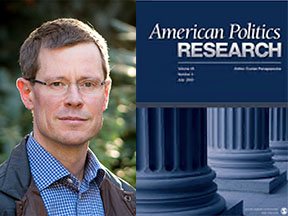
Gregory Huber, Forst Family Professor of Political Science, Director of the ISPS Behavioral Research Lab and the Chair of the Department of Political Science, has a new article in the American Politics Research journal entitled “Messages Designed to Increase Perceived Electoral Closeness Increase Turnout”.
Abstract:
The decision-theoretic Downsian model and other related accounts predict that increasing perceptions of election closeness will increase turnout. Does this prediction hold? Past observational and experimental tests raise generalizability and credible inference issues. Prior field experiments either (1) compare messages emphasizing election closeness to non-closeness messages, potentially conflating changes in closeness perceptions with framing effects of the voter encouragement message, or (2) deliver information about a particular race’s closeness, potentially altering beliefs about the features of that election apart from its closeness. We address the limitations of prior work in a large-scale field experiment conducted in seven states and find that a telephone message describing a class of contests as decided by fewer, as opposed to more, votes increases voter turnout. Furthermore, this effect exceeds that of a standard election reminder. The results imply expected electoral closeness affects turnout and that perceptions of closeness can be altered to increase participation.